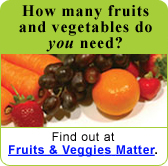Nutrition BasicsDo you ever feel like you can't keep up with the changes in technology? Sometimes it seems that way with dietary advice, as if things are always changing. While it's true that the fields of diet and nutrition are areas of evolving research, there are some basic concepts you can keep in mind. By knowing these basics, you will be better equipped to sort through nutrition research and dietary advice. |
 |
 |
Food Groups You may have grown up with the "Basic 4": dairy group, meat group, grain group, and the fruits and vegetables group. As nutrition science has changed, so have these food groups. This section helps explains food groups and provides some healthy eating plans. |
 |
Water Water is is involved in every function of the body. It's in every cell, tissue and organ of the body. In this section you'll learn why getting enough water everyday is important for your health. |
 |
Dietary Fat Whether you're looking for information about monounsaturated fat, polyunsaturated fat, saturated fat, trans fat, or cholesterol, you'll find what you need here. |
 |
Carbohydrates You may be wondering what all the hype is about carbohydrates or "carbs" as they are often called. Find out the facts. |
 |
Protein Then there's protein. How much do you really need? Can you get too much? You'll find answers to these questions and more by visiting this section. |
 |
Vitamins and Minerals Vitamins and minerals are nutrients your body needs to grow and develop normally. The NIH Vitamin and Mineral Supplement Fact Sheets provide information about the role of vitamins and minerals in health and disease. |
![]() Please note: Some of these publications are available for download only as *.pdf files. These files require Adobe Acrobat Reader in order to be viewed. Please review the information on downloading and using Acrobat Reader software.
Please note: Some of these publications are available for download only as *.pdf files. These files require Adobe Acrobat Reader in order to be viewed. Please review the information on downloading and using Acrobat Reader software.
* Links to non-Federal organizations found at this site are provided solely as a service to our users. These links do not constitute an endorsement of these organizations or their programs by CDC or the Federal Government, and none should be inferred. CDC is not responsible for the content of the individual organization Web pages found at these links.
Page last updated: March 6, 2008
Content Source: Division of Nutrition, Physical Activity and Obesity, National Center for Chronic Disease Prevention and Health Promotion


